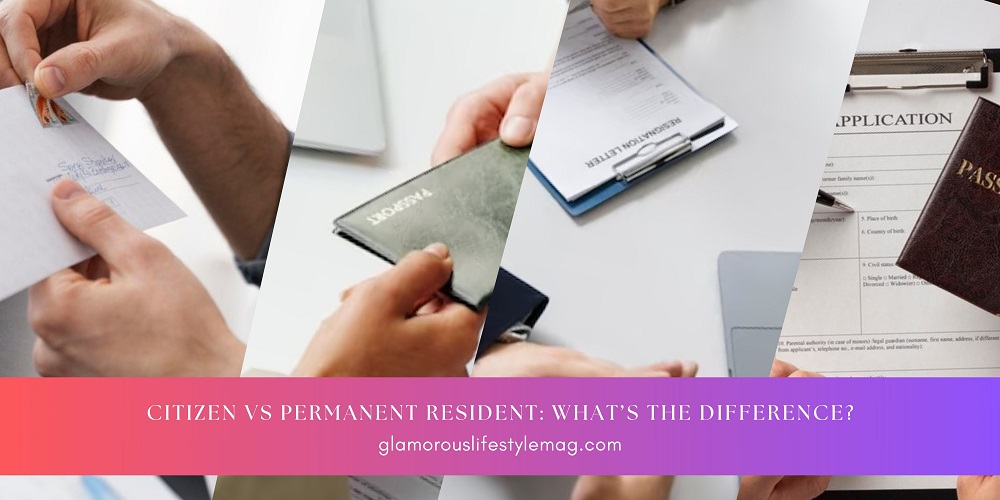
Citizen vs Permanent Resident: What’s the Difference?
Some common mix-ups people have about temporary residence permits, permanent residence, and citizenship. Even though they might seem similar, there are some big differences that can have a significant impact on your life and your family’s.
In this article, we’ll break down the distinctions between residency and citizenship. Plus, we’ll highlight countries that offer residency and citizenship. By the end, you’ll have a clearer picture of what it means to be a resident versus a citizen and the differences between being a citizen and a permanent resident.
| Difference | Citizen | Resident |
| Voting Rights | Have the right to vote and stand for public office | Not able to vote or stand for public office |
| Cancellation | Citizenship can’t be canceled | Permanent residency can be canceled |
| Residency | No residency requirement | Typically, there is a stipulated duration for residency in the country. |
| Validity | Citizenship is for a lifetime | The residency card is to be renewed |
| Inheritance | Citizenship can be passed onto your children | Depending on the circumstances and eligibility of your children |
What exactly is a Permanent Resident?
A Permanent Resident is basically a foreign national who has the proper legal authorization to live in the U.S. These residents not only have the green light to work in the country, but they also get to keep their citizenship status from their home country. This is a pretty big deal for those who still want to proudly identify as citizens of their own homeland.
Now, the key to this residency status is a nifty little document known as a Green Card. It’s not just any card – it’s like a multitasking superstar! Besides being a proof of your permanent resident status, it also plays the roles of a social security card and an employment eligibility document. So, you can think of it as the golden ticket that keeps you officially rooted as a permanent resident of the good ol’ United States.
What Is a Residence Permit?
A residence permit is like your ticket to stay in a country for a specific period, depending on your situation. It’s not a one-and-done deal – you’ll need to renew it regularly to keep it valid. But hey, it comes with some pretty cool perks!
With a residence permit, you can swing into the country whenever you want, snag some real estate, sort out health insurance, and even get your kids into school. If you’re rocking a residency permit in an EU nation, it’s like having a VIP pass – you can breeze into other Schengen countries for up to 90 days every six months without dealing with the visa fuss. And guess what? Besides the usual suspects like marriage, work, and study, you can also score a residence permit through nifty programs like the Golden Visa. It’s like the golden key to your stay in a new place!
Who Is a Citizen?
Being a citizen is a big deal – it means you’re a bona fide member of a country, and that comes with some weighty significance. The rules for earning the title of citizen can vary from country to country.
You might become a citizen by the simple fact of being born in a particular country, putting in a solid five to ten years of residency, or even being granted refugee status by the government. It’s like having a unique membership card that says, “Hey, I’m officially part of this awesome nation!
Perks and Privileges of Lawful Residents
The perks and privileges that come with being a lawful resident – it’s not quite the full citizenship package, but it’s still pretty sweet.
While lawful permanent residents won’t have the full array of benefits and rights enjoyed by citizens, having that coveted Green Card opens up a bunch of doors. The federal government welcomes them into various assistance programs, including heavy hitters like Temporary Assistance for Needy Families (TANF) and the Supplemental Nutrition Assistance Program (SNAP). And hey, they’re not left out when it comes to Medicare benefits and a bunch of other allowances.
Here’s a cool bonus: they can play the role of the superhero sponsor! Yes, they can be the sponsor for their spouse and unmarried children, making family reunions a smoother ride.
Oh, and let’s not forget some unique rights – they can step up to serve in specific military branches, and packing their bags for international adventures? Totally on the table. It’s like having a VIP pass to a bunch of opportunities!
Paths to Obtain Permanent Residency
The path to becoming a permanent resident in the USA involves various avenues of sponsorship. Let’s explore four ways to secure that coveted Green Card:
Family Sponsorship: This is a common and heartwarming route. If you have a relative who is a U.S. citizen or Green Card holder, they can be your key to unlocking residency. Your family member would need to prove your relationship and demonstrate an income at least 125% above the federal poverty level. The sponsoring relative completes the Petition for Alien Relative Form I-130 and an Affidavit of Support. Once approved, you can apply for lawful permanent residency.
Employer Sponsorship: If familial ties aren’t in the cards, perhaps your skills are! Skilled professionals seeking employment in the U.S. can have their employer vouch for them. The employer submits Form I-140, the Immigrant Petition form, to the United States Citizenship and Immigration Services (USCIS). This route is typically for individuals with exceptional talents or filling positions where there’s a shortage of American applicants.
U.S. Green Card Lottery: Feeling lucky? The U.S. Green Card Lottery is a unique opportunity where 50,000 individuals from underrepresented countries are randomly selected to receive Green Cards. While not as common as other methods, it’s an option for those looking to make a move to the United States.
Asylum: In exceptional cases where life is under threat due to war, persecution, or other reasons in your home country, applying for a Green Card through asylum is an option. After residing in the U.S. for a year under asylum, you can then apply for a Green Card.
Each path has its own story and requirements, offering individuals different avenues to make the United States their home sweet home.
Rights and Privileges of U.S. Citizens
U.S. citizens enjoy a myriad of rights, with permanent residency being the pinnacle. Here’s a snapshot of what citizenship entails:
Voting in U.S. Elections: Citizens can actively participate in shaping the nation’s future through voting.
Access to Driver’s Licenses: Citizens have the right to obtain and use driver’s licenses.
Education Opportunities: They can attend public schools and universities as citizens.
Financial Transactions: Citizens can open bank accounts and obtain authentic social security cards.
Eligibility for Federal Programs: Citizenship offers potential approval for various federal programs.
Employment Opportunities: Citizens can work with U.S. employers and even run for public office.
Passport Privileges: They can obtain a U.S. passport for international travel.
An additional perk of citizenship is the ability to sponsor family members for U.S. residency and facilitate citizenship for children born outside the United States.
Three ways to Attain U.S. Citizenship
While achieving permanent resident status is one milestone, obtaining U.S. citizenship involves a more intricate process. Here are three methods to acquire citizenship:
Naturalization:
File Form N-400, the Application for Naturalization, after holding a Green Card for five years.
You must be a minimum of 18 years old when submitting your application.
Reside in the state or district of filing for at least three months.
Demonstrate continuous, uninterrupted permanent residence for five years.
Show physical presence in the U.S. For a minimum of 30 months during the five-year span.
Proficiency in basic English, understanding of U.S. history and government, good moral character, and commitment to constitutional principles are required.
Marriage:
Spouses of U.S. citizens can file Form I-130, the Petition for Alien Relative.
Submission of marriage documentation is crucial.
Prove the legitimacy of the marriage and genuine emotional connection.
Military Service:
Military service members with Green Card status have the opportunity to apply for citizenship.
Submission of either Form N-400 or N-426 is necessary for military personnel seeking citizenship.
Choosing Between Permanent Resident and Citizen: What’s Your Best Fit?
For foreign nationals, both paths hold allure. While transitioning from permanent resident to citizen is common, opting to remain a Green Card holder may be the preferred choice.
Both journeys involve a substantial time commitment but ultimately grant access to the world’s largest economy. The good news? There’s no wrong decision!


